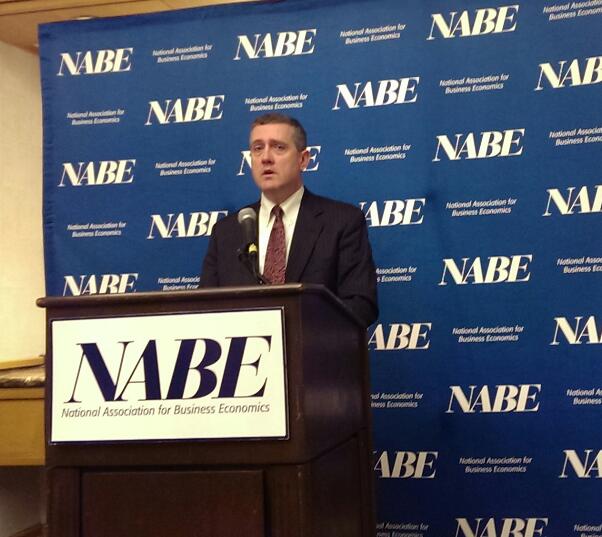WASHINGTON – The Federal Reserve should raise the short-term interest rate hovering near zero to 2 percent to avoid financial bubbles in the future, St. Louis Federal Reserve President James Bullard warned Tuesday.
Even though he doesn’t expect an asset bubble occurring in the U.S. economy now, Bullard said he is worried that if near-zero interest rates continue in the next few years, those rates combined with continued economic expansion would create another financial bubble in the future.
“That is a recipe for inflated asset prices that will eventually bust,” he told reporters after his speech to the National Association for Business Economics .
In particular, he said the ratio of household wealth to household income should be flat in normal times, but it rose during the Internet bubble in the late 1990s and the housing market bubble in late 2000s. Bullard said the value of the ratio today was close to the previous peaks, which worries him.
“A more prudent policy would be to raise interest rates gradually and slowly to mitigate that risk and extend the life of expansion,” he said.
However, he predicted the Fed would not increase the rates in its October meeting. “I think it is very tough for the committee to make a big decision and then change it after only one meeting because you only have limited amount of data between meetings.”
However, he argued that the Federal Reserve’s dual targets of maintaining an inflation rate of 2 percent and reducing unemployment rate to 4.9 percent have been “arguably” met.
The Consumer Price Index, excluding food and energy, has risen 1.8 percent over the 12 months through August. The unemployment rate was 5.1 percent in September, according to the Bureau of Labor Statistics.
He also emphasized that the economy could keep growing even with a slow rise in rates. He was optimistic about achieving economic growth of2.5 percent to 3 percent this year and predicted the unemployment rate would continue to fall to 4 percent over time.
In September, the Federal Reserve Board voted to keep interest rates unchanged because of the low inflation rate and global financial instability, including China’s financial crash.
But Bullard said that emerging economies have had a long time to prepare for a possible Fed interest rates hike because it has been discussed since the beginning of 2014. And the International Monetary Fund kept China’s economic outlook unchanged at 6.8 percent growth in October, which gave him confidence about the global economy.


